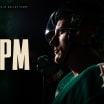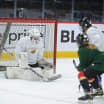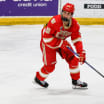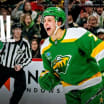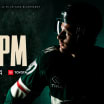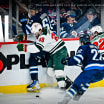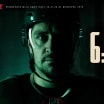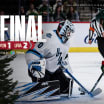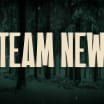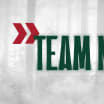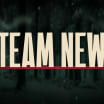Moments before faceoff between the Wild and Blues at Xcel Energy Center, the franchise's veteran radio voice is hunched over a St. Louis roster ticking off names.
Bob Kurtz has Minnesota's down verbatim, of course. And the Blues are hardly strangers during this COVID mash of relentless clashes between the erstwhile Central Division foes. But you never know. A late scratch, undisclosed injury or random call-up can scramble line combinations, defense pairings and the rhythm of a broadcaster who has spent five decades calling it straight from arenas and ballparks across North America.
Last names are underlined and highlighted in yellow. For color-coded jottings on special teams and whatnot, there are blue, green, pink and black markers within hand's reach, along with an open bag of throat lozenges.
Last call? Kurtz poised to sign off after 20 years at the Wild mic
Legendary radio voice mulling retirement as potential final playoff run set to commence this weekend
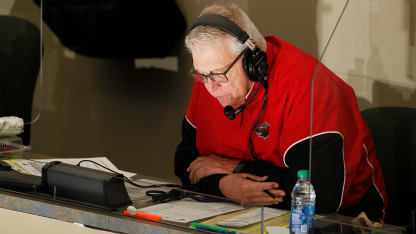
Socially distanced to Kurtz's right is longtime partner, Tom Reid, separated by a plastic partition and another stack of game notes and media clips. The septuagenarians in headsets are staring down at center ice preparing to describe and analyze the performances of youthful NHL stars like Statler and Waldorf in the Muppets balcony, wise to their craft and wry in their pregame banter.
"Welcome back, everyone, to Xcel Energy Center in downtown St. Paul, I'm Bob Kurtz along with Tom Reid and we're just about ready to go again against, you guessed it, the St. Louis Blues."
The puck drops, and the 1,559th regular-season game in franchise history unfolds April 28 as the play-by-play workhorse settles into his familiar cadence, introducing the Wild moving "left to right across your radio dial," a traditional nod to the pre-digital era of listening.
The clock is ticking on Kurtz's 20 years with the franchise and 43rd in the booth, where he also has called games on radio and television for the Red Wings, Twins, North Stars and Red Sox. He is 73 and sharp as ever, painting a clear picture for an audience trying to visualize the puck bouncing around the ice in the most unpredictable sport on the planet.
But after a lifetime of staring up at hotel ceilings, downing room service, chasing buses and typically hitting the pillow at 3 a.m., Kurtz is poised to retire after Minnesota's postseason run. He's been saying as much since 2016, yet "something always happens" and Kurtz finds himself bored after summer vacation and back at training camp in September. However, this season's compressed schedule, postponements, pandemic protocols, his father's death and three-hour round-trip commutes to and from his Wisconsin home have taken their toll.
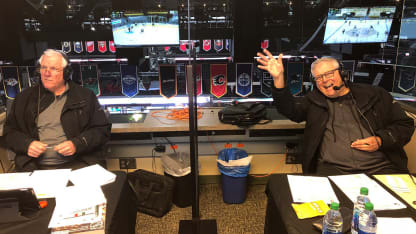
© Kevin Falness
The door remains cracked ever so slightly for a 2021-22 return. But the time feels right to sign off for the final time whether the Wild are quickly eliminated or hoist their first Stanley Cup.
"I'm probably done," Kurtz said during a recent interview. "My contract's to June 30. There's no sense making any decisions until you have to. But now that I'm getting older, it's getting to be more of a grind.
"The Wild have been really good to me; they've been very accommodating, allowing me to work a reduced schedule. Some places, they aren't so accommodating."
The Buffalo Sabres recently feted radio broadcaster Rick Jeanneret for his 50 years behind the mic. Three years ago, the Carolina Hurricanes offered Chuck Kaiton a new contract and 80-percent pay cut. Kaiton said no thanks and walked away after 39 years with the franchise he followed to Raleigh from Hartford.
Kurtz wants to leave on his terms, like his mentor in his native Detroit, Bruce Martyn, who retired from the Red Wings in 1995 after 31 standout years.
"We'll see where we are when this whole thing is done," he said.
An unlikely beginning
No way a young Bob Kurtz makes it in today's ultracompetitive business. He was stocking grocery shelves in 1970 when he wandered into WKAR-TV in Lansing, Mich., and naively asked how to become a broadcaster. Kurtz, who was attending Michigan State, was told by the station manager to go learn the ropes at the school's sports information department.
So he pulled graveyard studio shifts at the local radio station ("hated it") but eventually landed gigs calling Spartans hockey and football, mostly on tape delay. He also freelanced at WJR, Detroit's powerful sports flagship station.
Kurtz caught a big break in March 1977 when venerable Red Wings analyst Sid Abel shattered his hip skating with his granddaughter at Olympia Stadium.
Kurtz was tapped to ride shotgun with Martyn for the final 14 games of Detroit's 18-game winless streak, mostly reading out-of-town scores and taking the broadcast in and out of intermission.
"Bruce was great; just sensational on the air and in person," said Kurtz, who caught the NHL bug and became determined to cover pro sports.
Traveling with the Spartans hockey team to play the Gophers at Mariucci Arena, Kurtz fell in love with Minneapolis, so much that he subscribed to the Star Tribune via mail. One day in the paper, he spotted an ad by then-independent Channel 9 seeking new sports announcers.
Kurtz sent in his tape and got the play-by-play job calling North Stars games at the end of the 1978-79 season. The station liked him so much they immediately added him to the Twins broadcast schedule, which then consisted of about 50 games - almost all of them on the road.
LISTEN: Bob Kurtz calls Marian Gaborik's fifth goal in a game played against the Rangers on Dec. 20, 2007
Kurtz teamed with Harmon Killebrew for several losing seasons. But he was there to chronicle the arrival of future stars Kent Hrbek, Gary Gaetti, Frank Viola and Kirby Puckett - the core of the 1987 World Series championship club.
By then, Kurtz was back for one more season with the North Stars, before spending a couple of years freelancing in St. Louis and Detroit. In 1993, he joined NESN cable to call Boston Red Sox games and college hockey in New England.
"There's no better place to win than Boston, but probably no worse place to lose," Kurtz recalled. "It was different. Very intense. Everything is serious. If the Red Sox lost, it was a personal affront to the fans. I'm serious. They have the most passionate fans I've ever seen. Here, it's a little milder. It's gotten more of a bite recently but nothing close to New England. Those fans can be vicious."
It was a prime-time TV beat, but Kurtz longed to do radio again, like Martyn and his other Motown influence, Ernie Harwell, the late hall-of-fame play-by-play icon for the Tigers.
Kurtz had the announcing chops and Minnesota street cred when the expansion Wild hired him in 2000 and eventually reunited him with Reid, with whom he first called North Stars games in 1980.
Nothing primal about him
There is something familiar and comforting listening to Kurtz perform his craft. His voice betrays that of someone who knows exactly what is going on. An adult who can convey the thrill of the action and tension of the moment by going up a few octaves without beating the listener over the head or making it all about him.
A throwback to be sure. Someone who might not have a statue erected, but a pro's pro who can hold an audience's attention over 2 ½ hours as he did when he first strapped on a headset 40-some years ago.
"I love the games. Once they drop the puck, it's fun," he acknowledges. "Radio's more fun. It's more free form. The thing about TV is you basically follow the picture; they're choosing what you talk about. Most guys can do it. Radio's harder but it's also easier.
"You don't always have somebody in your ear all the time telling you what to do. You only have to work with your partner, but it's also all on you. If you get lost on TV, you can just shut up and let the picture cover it."
The curmudgeonly gentleman bristles at the primal screaming or shticks that dominate contemporary goal calls, which seem prepackaged to endlessly loop for YouTube bingers and Twitter scrollers.
The last thing Kurtz wants to be known as is a homer.
"I'm more down the middle, with a little turn to the right," he said with a grin. "One of the best pieces of advice I got in the business was from Bruce telling me one time, 'save something for the game-winning goal in Game 7 of the Stanley Cup.'
"The screaming in hockey really bothers me. There's more to calling a hockey game than screaming on a goal."
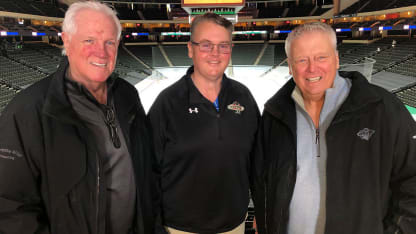
© Kevin Falness
Speaking of championships, Kurtz has never called one. He cherished the Wild's unlikely run to the 2003 Western Conference finals, which included consecutive overtime wins to vanquish the Colorado Avalanche and another 3-1 series rally against Vancouver.
LISTEN: Bob Kurtz calls Richard Park's game-winning goal in overtime of Game 6 against the Avalanche
LISTEN: Bob Kurtz calls Andrew Brunette's game-winning goal in overtime of Game 7 against the Avalanche
There was that time in 1980 when the North Stars stunned the four-time Stanley Cup champion Montreal Canadiens by winning a Game 7 at the Forum. But he missed out on their 1991 run to the Finals, and all of the Red Sox's overdue success in the 21st century.
Does it gnaw at him?
"I don't want to say it's overrated, but you have nothing to do with it. Absolutely nothing," Kurtz said. "I think I would feel weird wearing a ring like some guys who get off on it. What's nice about winning teams, you get big, important games. That's the more fun thing."
Perhaps Kurtz will get his chance this spring.
The Wild arguably have their deepest, most talented team ever, led by rookie scoring sensation Kirill Kaprisov.
"Hockey is known for Cinderellas," he said. "With how this season has gone, who knows?"
Meanwhile, back in the Xcel booth, the Wild took a 3-1 lead into the third period against the Blues only to surrender three unanswered goals, including Robert Thomas' winner with 23 seconds remaining.
As the smattering of fans departs the arena, Kurtz rattled off the scoring summary and teed up the starting time of the rematch with Blues the following night. He signed off at 8:36 p.m., dropped his headset on the counter, stuffed his paperwork into a black satchel, tucked his reading glasses into a breast pocket and strolled to the press box elevator like he has hundreds of times.
Out into the St. Paul night and an uncertain future that seems predestined to be the capstone to an understated and dignified career that deserves a celebratory stick-tap from the State of Hockey.
Main photo by Bruce Kluckhohn
Other photos courtesy of Kevin Falness

